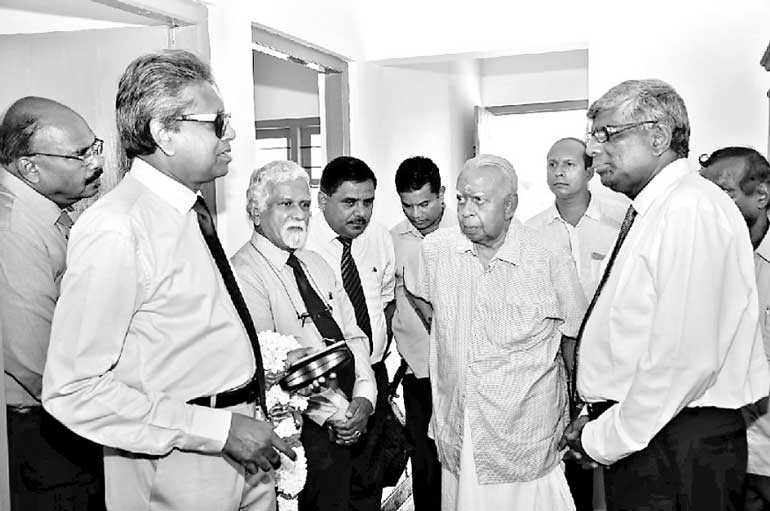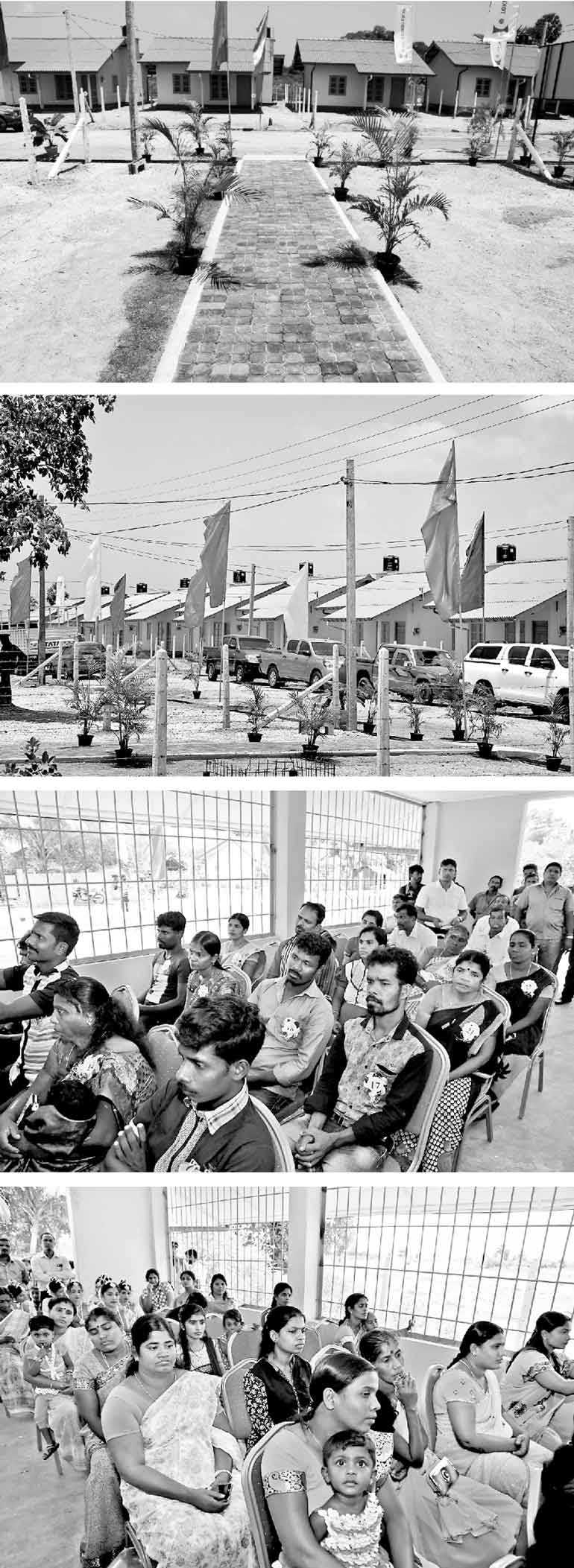Sunday Feb 22, 2026
Sunday Feb 22, 2026
Saturday, 5 May 2018 00:00 - - {{hitsCtrl.values.hits}}

Not having a place to call home or to be safe and comfortable with your loved ones is one of the most destitute situations no human being ever wants to be in. Imagine a situation where you had to let go of everything you own, give up that safe and secure surrounding you earned and built for yourself and having to flee from where you were born, flee from your own land. Just over two decades ago, to some of our own brothers and sisters in the North and East of the country, this was not an imaginary situation.
Not only was this their scary reality, it was also a defining moment in their lives, compelled to choose between their worldly belongings and life itself. Faced with an escalating war, many chose to uproot their entire families and say good bye to everything they ever owned and move to safety. Very few families had the means to restart life anywhere else. While some became refugees in their own motherland, some chose to leave the country and seek shelter in neighbouring countries. With no end of the war in sight and displaced from your own land, these families had to experience some of the harshest living conditions imaginable. The only ray of light they had was the hope that one day they could return back to their homeland, even if they had no home to come back to.
This hope came to fruition with the end of the war a decade ago, but the bitter truth of not having a place to come back to, continued to haunt them. Their homes and all means of livelihood were forever destroyed. Deprived of any proof of ownership and their land being occupied by strangers, they had very little hope of getting back to the ways of life they once knew. Once again, these families had to either take refuge with relatives, who in turn were struggling to resettle and get back on their feet or settle at makeshift camps until the government found a permanent solution.
It was the children who took the biggest toll. Forced to pay for wrongdoings they had no idea of, hundreds of children, whose families were struggling to make a living as refugees on their own motherland, were traumatised by not having a safe place to live and without access to their basic needs. The call of the hour was to provide these children with a safe environment to grow up in, go to school, learn, play, be safe, be happy.
Tokyo Cement Group, committed to enrich the country as a dedicated partner in nation building, rose up to this call and identified ‘housing’ as the single factor that will bring back a sense of stability and purpose to this once displaced and disenchanted community. With this vision the company took swift steps to allocate their own land in Adampodai, Nilaveli to set up a Housing Scheme for 25 families. This was to become the initial phase of a much larger project to uplift the lives of Internally Displaced Personnel in Trincomalee.
Foundation for a housing project for 25 IDP families was laid on 5 May 2017, in commemoration of late Deshamanya A.Y.S. Gnanam, Founder Chairman of Tokyo Cement Group. Incumbent Chairman of Tokyo Cement, President’s Counsel Dr. Harsha Cabral presided over the foundation laying ceremony which was part of a string of events that marked the late pioneer’s birth anniversary. The housing project adjoins Tokyo Cement Tsunami Housing Scheme built in 2009 by the Tokyo Cement Tsunami Relief Trust, and 25 families affected by the tsunami received deeds to the houses from HE the President during the same commemoration ceremony.

Vignettes from the key handing-over ceremony of the Tokyo Cement IDP Housing Project
Less than a year later, on 21 March 2018 the new housing scheme for IDPs was declared open by R. Sampanthan MP, Leader of the Opposition in Parliament in the presence of N.A.A. Pushpakumara, Government Agent and District Secretary of Trincomalee, Dr. Harsha Cabral P.C., Chairman and Christopher Fernando, Executive Director of Tokyo Cement, amidst a gathering of management and staff, beneficiaries of the project and government officials in the area. The beneficiaries to receive houses were chosen among hundreds of IDP families who were living under dire circumstances for decades by an evaluation committee headed by the GA comprised of the Divisional Secretary and local government officials.
R. Sampanthan MP, who handed over keys to part of the 25 families, reminisced how he requested late Gnanam to provide job opportunities to people from the area on the day former President J.R. Jayewardene laid foundation for the Tokyo Cement Factory in 1984, and thanked the company for unreservedly fulfilling that request. While acknowledging Tokyo Cement for going above and beyond its call of duty to the nation since then, he commended the company for initiating the housing project, first for Tsunami victims and now for families returning from India as part of the resettlement program.
Factory of Tokyo Cement Company (Lanka) PLC General Manager Ravindrakumar – who spearheaded the entire project in liaison with the local authorities mentioned that the new housing project was fully completed in just 10 months with each house costing around Rs. 2.3 million. Each house is built on a 10-perch plot of land and is fully fledged with all basic amenities along with paved roadways, a community centre and a children’s park. Upon completion, Tokyo Cement made extra effort to make the newly-built, spacious 2-bedroomed house a home from day one for its occupants, by furnishing it with a bed and a wardrobe, signifying the fresh start for a community of over 100 people. He said the company is proud to have contributed to give a small piece of luxury to these families who had been through many hardships and will continue to bring more value to the lives of people in the area.
It was a humbling occasion to have provided stable living conditions to a group of citizens who were displaced in our own country, and for the first time provide a roof above their heads built upon a plot of land they could call their own. Tokyo Cement’s commitment to enrich the country, its people and the environment breathes life in many forms similar to this keeping the legacy of late Deshamanya A.Y.S. Gnanam alive and meaningful. The company has successfully integrated social welfare and environmental conservation into its corporate DNA, which gets reflected in every aspect of the business.
Through a number of socio-environmental outreach programs the company has proven that it is within every corporate citizen’s control to make an impact while achieving sustainable business growth. What fuels the company on this path is the very life of late Deshamanya A.Y.S. Gnanam, which is an inspiring story of courage and perseverance, where his business achievements are only matched by his benevolence. The self-taught industrialist, who subscribed to the belief that true value can only be achieved through people with a commitment to quality and service, Gnanam’s legacy and the values he embodied will continue to be the driving force of the Tokyo Cement Group.
